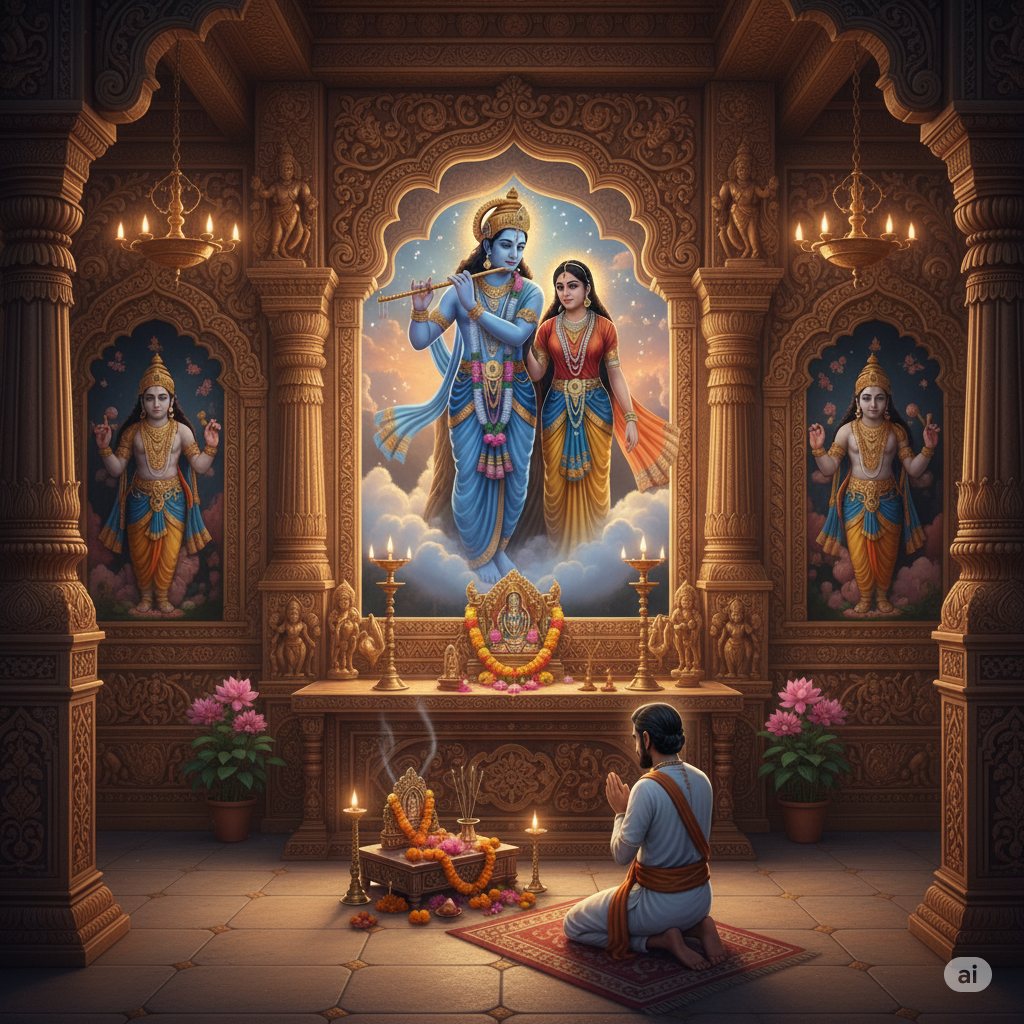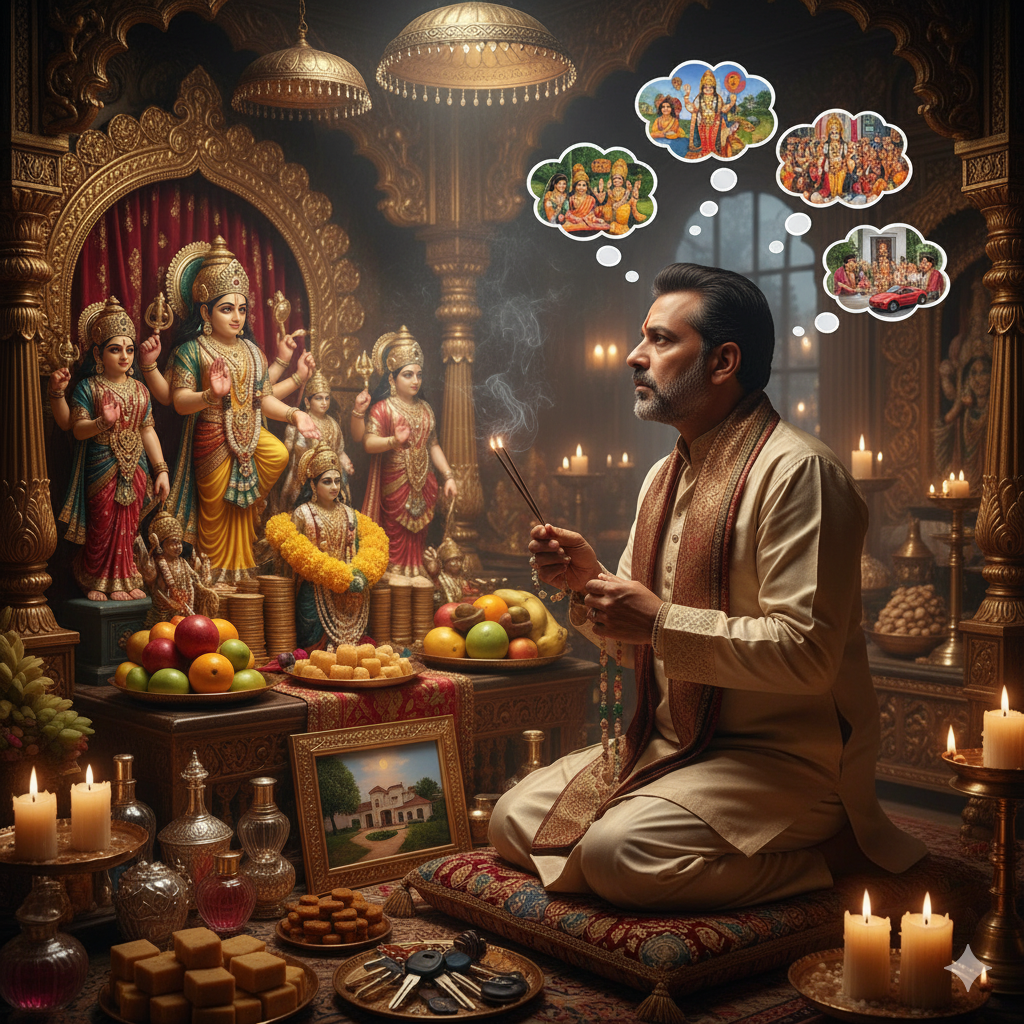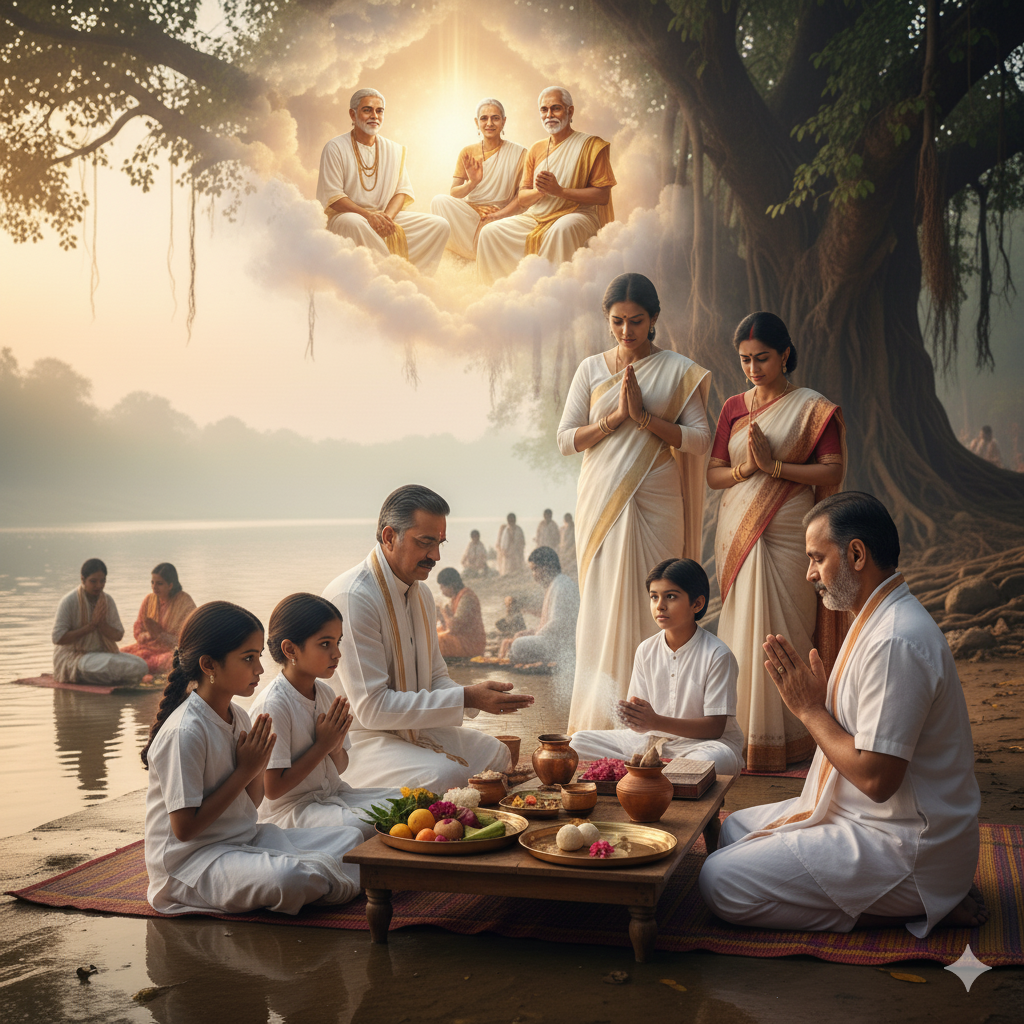In the Bhagavad Gita, worship of God, acharya (Guru), deities, ancestors, demigods, demons, ghosts, etc., has been described along with the results of such worship, as follows:
In the Bhagavad Gita, worship of God, acharya (Guru), deities, ancestors, demigods, demons, ghosts, etc., has been described along with the results of such worship, as follows:
1. Those who worship God
Four types of devotees worship God or take refuge in Him (B.G. 7.16):
- Artharthi (those seeking desired objects),
- Artha (those in distress),
- Jigyasu (the seekers of knowledge), and
- Jnani (the lovers of God)
Those who worship and glorify God ultimately attain Him — “मद्भक्ता यान्ति मामपि” (B.G. 7.23); “यान्ति मद्याजिनोऽपि माम्” (B.G. 9.25).

2. Those who worship their Acharya
Those who are liberated in the true sense, knowledgeable, God-loving, great souls whose lives are based on the scriptures, are called ‘Acharyas‘.
Obeying the instructions of such an Acharya and shaping one’s life according to his principles is considered worship of the Acharya (B.G. 4.34, 13.7). Those who worship their Acharya in this manner are liberated from death (B.G. 4.35, 13.25).

3. Sakaam-Karmis: Those who worship deities to fulfill their desires for pleasure
Those who are absorbed in desires and believe that enjoyment and accumulation of pleasures are the only goals perform the auspicious actions mentioned in the Vedas to attain such pleasures (B.G. 2.42–43). People who seek the results of their actions worship deities, because in the human world, the success born of actions is obtained quickly (B.G. 4.12).
Those whose intellect is clouded by the desire for pleasure abandon God and take refuge in the deities. Influenced by their own nature, they adopt various rules and methods to fulfill their desires (B.G. 7.20). God says that whichever deity a devotee wishes to worship, He strengthens that devotee’s faith in that deity. With that faith, the devotee worships that deity — but the fruit he receives from that worship is granted only by God (B.G. 7.21–22).
The sinless men who perform sakaam karmas prescribed in the three Vedas, drink Soma juice, and worship Indra through yajñas, seek heaven (B.G. 7.20).
Even those who, out of desire, worship other gods with devotion are, in reality, worshipping Me (God); but their worship is without proper understanding or rules (B.G. 9.23).

Men who worship the gods go to heaven, and after enjoying the fruits of their good deeds there, return to the mortal world (B.G. 9.20-21). Those who worship the gods reach the gods, i.e., go to their worlds – ‘देवान्देवयजो‘ (B.G. 7.23); ‘यान्ति देवव्रता देवान्‘ (B.G. 9.25).
4. Those who worship ancestors (Pitr)
The devotees of the ancestors worship the ancestors and as a result they reach the ancestors, i.e,. go to the ancestral world – “पितॄन्यान्ति पितृव्रता:” (B.G. 9.25). But if they worship their ancestors selflessly, considering it a duty, then they become free.

5. Those who worship Yaksha-Rakshasas (Demigods-Demons)
Rajasic people (one in the mode of passion) worship Yaksha-Rakshasas (B.G. 17.4) and, as a result, they attain demigods-demons, i.e., go into their planets.

6. Those who worship ghosts
Tamasic men worship ghosts (B.G. 17.4). Those who worship ghosts and spirits attain the ghosts, that is, go into their world – “भूतानि यान्ति भूतेज्या” (B.G. 9.25).

In the Bhagavad Gita, there is no prohibition to serve and worship human beings, gods, ancestors, demons, etc., without any selfish motive; rather, the great glory of serving and worshipping all has been sung (B.G. 5.25, 6.32, 12.4). It means that if duties, work, worship, etc., are performed without any selfish motive and as per the command of the scriptures only for the nourishment and progress of the gods, then man is not bound by it; rather, he attains God (B.G. 3.11).
Similarly, if food and water offerings to ancestors are performed for their satisfaction, considering it a duty without any selfish motive, and as per the command of the scriptures, then one attains God.
If, for the repayment of debts of Yakshas, demons, ghosts, spirits, etc., and for giving them peace and happiness, ancestral rites are performed in their name, Bhagwat-saptah (Seven-Day Recitation of the Bhagavata Purana) is performed, charity is given, chanting of God’s name, Bhagavad Gita-Ramayana, etc., are recited, etc., without any expectation and as per the scriptures, then they are redeemed, they get peace and happiness, and the devotee attains God.
Considering those gods, ancestors, Yakshas, demons, ghosts, spirits, etc. as one’s deity and worshipping them with any selfish motive is the reason for special bondage; the reason for birth-death, degradation.
The meaning of both the things mentioned above is that having a feeling of success in oneself and not having a Godly vision in the person one serves is the reason for birth and death. If there is selflessness in oneself and the person to be served has God-consciousness, then that service will definitely lead to attaining God.
Which one is permanent?
It is remarkable that even when a person worships God with a selfish motive, that worship still leads to liberation. The only requirement is exclusive devotion to God. In the Gita, the Lord calls the four types of devotees—the seeker of wealth, the distressed, the inquisitive, and the knowledgeable—udārāḥ, meaning noble or generous (B.G. 7.18). He also declares that those who worship Him ultimately reach Him (B.G. 7.23, 9.25). Thus, no matter what sentiment a person begins with, sincere engagement with God surely leads to liberation.
In contrast, the results of worshipping other deities are temporary (B.G. 7.23). Such worshippers rise to higher realms like heaven by the strength of their merits (good deeds), but return once those merits are exhausted. Attaining God, however, is eternal (B.G. 8.16), because the soul is a part of Him (B.G. 15.7). Therefore, when a soul reaches Him through the grace of the Supreme Soul, it never returns (B.G. 8.21, 15.6). The grace of the Supreme Soul is everlasting, whereas the merits that lead to heaven and other realms are temporary.
Note: This post is highly inspired from articles in the book “Gita Darpan” by Swami Ramsukhdas published by Gita Press, Gorakhpur. Refer this to have more knowledge on the subject.
With over three years of dedicated experience in studying and researching Indian scriptures, the author is passionate about sharing the profound wisdom of texts like the Bhagavad Gita, Puranas, and Upanishads. Through in-depth exploration of authentic commentaries, such as those by Gita Press, combined with thoughtful online research, the insights provided are both accurate and engaging.



